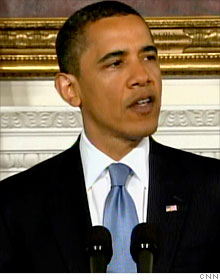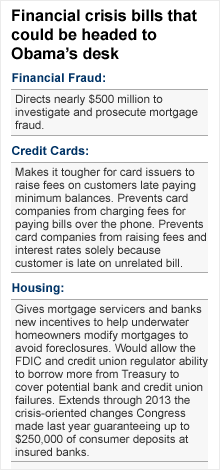Why Obama needs Congress
Lawmakers sent the president 3 bills to help consumers hurt by recession. But many fights over much more complex proposals are ahead.
 |
| President Obama has a big agenda ahead. |

WASHINGTON (CNNMoney.com) -- President Obama's economic team might be able to crack the champagne: Congress has just passed bills aimed at helping consumers weather the financial crisis.
The bills mark the first major pieces of economic legislation to cross the president's desk since he signed the stimulus package in February.
President Obama signed legislation Thursday that directs more resources to fight mortgage fraud and makes it easier for struggling homeowners to get their mortgages modified. On Friday, he'll sign a bill to crack down on credit card companies.
The bills also underscore a political fact of life for Obama: While the economic agenda is front and center, and the president's popularity is soaring, his success in navigating the financial crisis is largely in the hands of Congress.
The stimulus bill -- an extraordinary $787 billion in spending and tax cuts, passed during Obama's fourth week on the job -- set a high bar.
"There are expectations to produce legislative accomplishments that probably aren't realistic," said Jaret Seiberg, a policy analyst with Concept Capital's Washington Research Group. "It's not like Congress can put the budget on hold, put the debate over military on hold. There's a whole bunch more to keeping this country running than the financial crisis."
Indeed, experts say, Obama has plenty more congressional arm wrestling ahead of him.
The bills that Obama is getting this week highlight the long road ahead on far more complex issues such as taxes, health care, energy and regulatory reform.
Take credit card legislation, which Congress passed overwhelmingly this week, and the president is expected to sign Friday.
Congress has tried for two years to pass the measure that curtails the ability of card issuers to hike fees and interest rates. While the bill will help consumers starting next February, it's only slightly tougher than new Federal Reserve rules scheduled to go into effect in July 2010.
On Tuesday, Congress sent to the president a bill revamping legislation passed last year to help homeowners avoid foreclosure. It would give new incentives to banks that work with consumers to modify mortgages.
But the final version of the housing bill lacks a strong provision -- one that failed 45-51 in the Senate -- to allow bankruptcy judges to force banks to change the terms of mortgages held by struggling homeowners.
In the meantime, administration officials and lawmakers have begun work on a host of even more complex issues that have yet to be formally introduced.
Lawmakers have been holding closed-door discussions about options for expanding health care to the uninsured. In addition, House panels have been holding hearings in recent weeks to try to find a consensus on new financial regulations.
And on Tuesday, a House panel started wading through dozens of amendments to a proposed cap-and-trade bill aimed at cutting greenhouse gas emissions.
The Obama administration's efforts to push so many pieces of complex legislation at one time is relatively unprecedented. Still, many experts say the administration had no choice because of the financial crisis.
"What's really different about this administration is they see it all as interrelated. It's both appropriate and necessary to deal with all these issues together," said Nick Allard, a Patton Boggs lobbyist and attorney who advised Sen. Ted Kennedy, D-Mass.
For example, Allard said, using stimulus funds to invest in broadband technology can help health care companies become more efficient and save money, possibly spurring them to participate in new government plans to provide health care to the uninsured.
One danger when Congress tackles so much so quickly is that the pace provides far more opportunities for mistakes. When Congress whizzes through complex legislation, such as a 932-page energy bill, which was taken up in a committee Tuesday, bad policy can sometimes sneak in.
"The real question is what are the safeguards and procedural checks to remedy unintended consequences," said Robert Raben, who worked as counsel to Rep. Barney Frank, D-Mass., and now leads the Raben Group lobbying firm.
Another reason the administration has launched such an ambitious agenda: It understands that Congress can take awhile to chew on proposals, especially complex or controversial topics. It's possible that some initiatives don't get completed during this Congress, experts say.
"A lot of these things have really long fuses," said Rob Nichols, who worked for both Bush administrations and now runs the Financial Services Forum, a trade group. "You just have to start them now." ![]()

